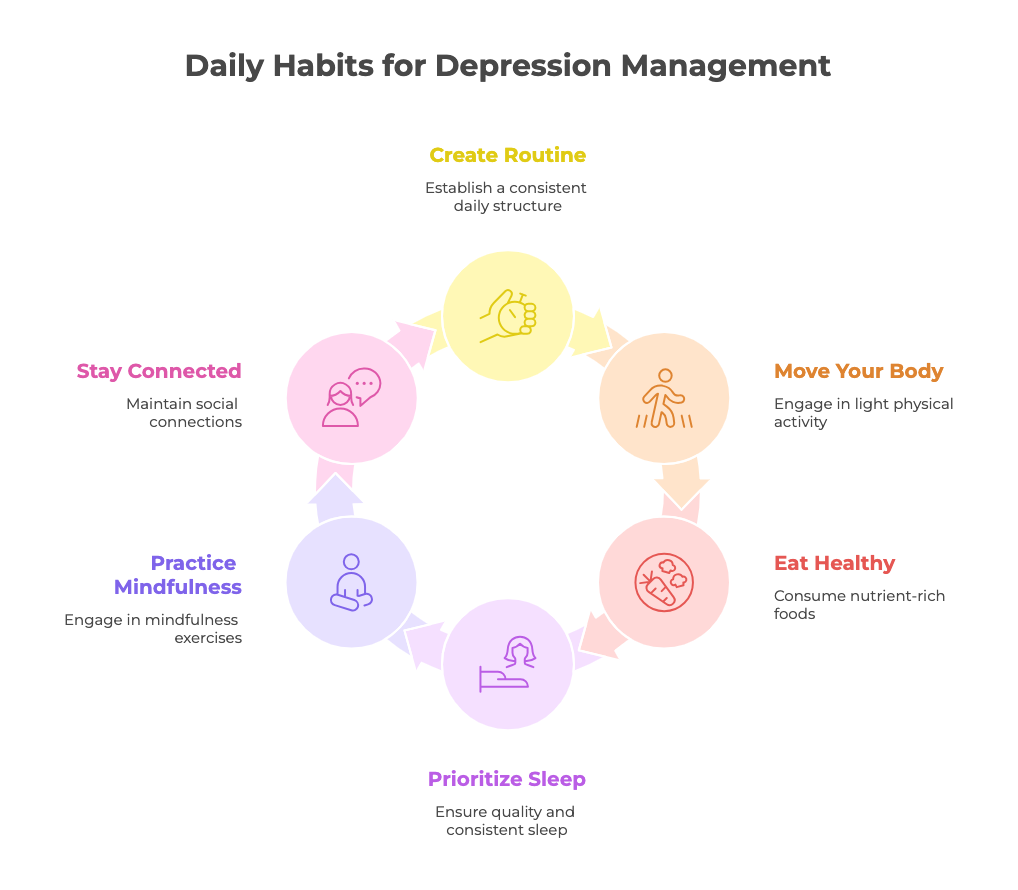What Daily Habits Can Help Manage Major Depression?
Depression can make even basic tasks seem daunting, and your days might start to run together. However, studies show that steady helpful daily routines, along with expert help, have a big impact on handling depression symptoms. Let’s look at some habits you can implement to support your mental health journey.
Create A Gentle, Consistent Routine
Depression often messes up structure, and this lack of routine can then make your symptoms even worse. Setting up a simple schedule will help to break this cycle and bring back some stability and control. These habits don’t need to be big. First, try small changes like getting up and going to bed at the same time every night, eating your meals at set times, or coming up with your own quick morning or evening ritual. You don’t have to plan out every hour of your day just enough to add some rhythm to your day.
Move Your Body
It’s important to incorporate some physical activity into your day. Now you don’t need to run a mile to see the benefits, just some light movement will help alleviate some of your symptoms and boost mood-regulating brain chemicals like serotonin and dopamine. You can try going for a short walk, gentle yoga, or even stretching. The key is consistency not intensity. If you are having a bad day try just taking time to get up and stretch.
Eat to Support Your Mood
Research continues to show that the food we eat impacts our brain chemistry and mood. High-nutrient diets can help balance serotonin and dopamine, which regulate our mood and emotional reactions. On the other hand, diets high in processed foods, sugary foods, and unhealthy fats can promote inflammation and impair brain function, thus worsening symptoms. Focus on eating omega-3-rich foods (salmon, flaxseeds, walnuts), vegetables and leafy greens, whole grains, and lean proteins.
When you’re depressed, choosing healthy foods can be difficult. Here are some basic techniques you can implement to start including more nutrients in your diet:
- Try incorporating more fruits, veggies, and whole grains into your meals.
- Try meal prepping, or making simple meals in advance, so you are less likely to rely on takeout or processed foods.
- Make sure you are drinking plenty of fluids, as dehydration can add to feelings of fatigue and irritability.
- Try to limit your sugar intake. While it can provide a spike in energy for a time, in the long run, it can contribute to mood swings.
While improving diet alone won’t cure depression, it can be a valuable component of a larger treatment approach.
Prioritize Quality Sleep
Having poor sleep can worsen symptoms, and depression can often disrupt sleep. Getting a good night’s sleep is very important in breaking this cycle and can make a huge difference in making you feel better. To get better rest you should try to go to sleep at the same time every night. You can also create a nightly routine to help you wind down before bed, like reading or journaling. Also, try limiting your screen time before bed as it can interfere with your body’s production of melatonin, making it harder to fall asleep. Sticking to these habits will have major positive long-term effects on your mental health.
Practice Mindfulness and Self-Compassion
Being mindful can slow down your racing thoughts and help you stay in the present which is key when you’re dealing with depression. You don’t need to sit and meditate for hours – just try to breathe for 5 minutes, follow a quick guided meditation, or jot down your thoughts in a journal. Remember you’re not aiming for perfection here. The goal is to reconnect with yourself, one moment at a time.
Stay Connected (Even in Small Ways)
Isolation can cause depression to get worse, but staying connected does not have to mean constant socializing. Start small:
- Text a friend
- Join a support group
- Go on a short walk or phone call with someone you trust
- Schedule a low-pressure outing, like visiting a local coffee shop
Human connection is a very powerful medicine. Remember, you don’t have to go through this alone.

A Final Note from MDDCare
We know there is no quick fix for depression, but forming these habits will set you on the right path to healing. If you know someone living with depression, options like TMS or Spravato may offer new hope. At MDDCare, we make it easier to find trusted clinics near you that offer these advanced treatments. Search for a clinic near you today and explore your options.
